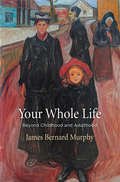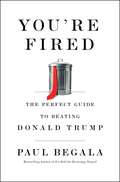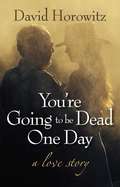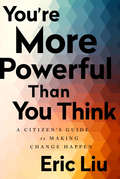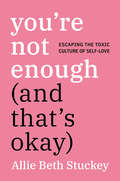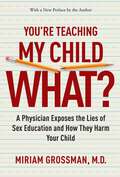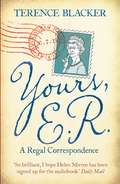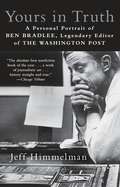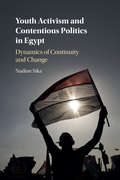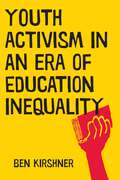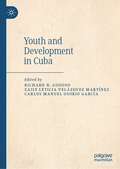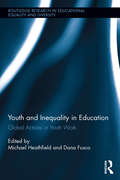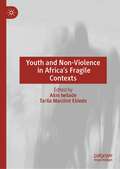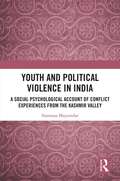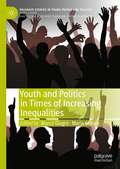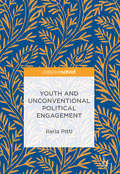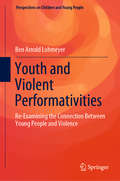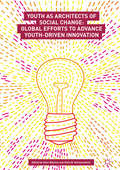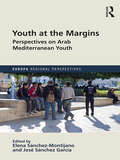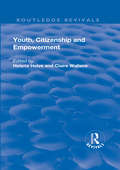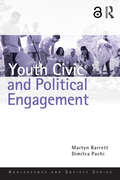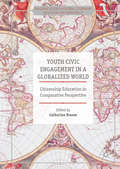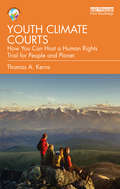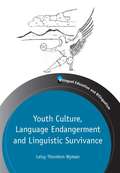- Table View
- List View
Your Whole Life: Beyond Childhood and Adulthood (Haney Foundation Series)
by James Bernard MurphyA holistic view of human development that rejects the conventional stages of childhood, adulthood, and old ageWhen we talk about human development, we tend to characterize it as proceeding through a series of stages in which we are first children, then adolescents, and finally, adults. But as James Bernard Murphy observes, growth is not limited to the young nor is decline limited to the aged. We are never trapped within the horizon of a particular life stage: children anticipate adulthood and adults recapture childhood. According to Murphy, the very idea of stages of life undermines our ability to see our lives as a whole.In Your Whole Life, Murphy asks: what accounts for the unity of a human life over time? He advocates for an unconventional, developmental story of human nature based on a nested hierarchy of three powers—first, each person's unique human genome insures biological identity over time; second, each person's powers of imagination and memory insure psychological identity over time; and, third, each person's ability to tell his or her own life story insures narrative identity over time. Just as imagination and memory rely upon our biological identity, so our autobiographical stories rest upon our psychological identity. Narrative is not the foundation of personal identity, as many argue, but its capstone.Engaging with the work of Aristotle, Augustine, Jesus, and Rousseau, as well as with the contributions of contemporary evolutionary biologists and psychologists, Murphy challenges the widely shared assumptions in Western thinking about personhood and its development through discrete stages of childhood, adulthood, and old age. He offers, instead, a holistic view in which we are always growing and declining, always learning and forgetting, and always living and dying, and finds that only in relation to one's whole life does the passing of time obtain meaning.
You're Fired: The Perfect Guide to Beating Donald Trump
by Paul Begala&“You&’re fired!&” Donald Trump became famous bellowing those words in a make-believe boardroom. In November, tens of millions of Americans want to yell it right back at him. Yet Trump has seemed to almost defy the laws of political physics. Paul Begala, one of America&’s greatest political talents, lays out the strategy that will defeat him and send him and his industrial-strength spray-on tan machine back to Mar-a-Lago.In You&’re Fired, Paul Begala tells us how Trump uses division to distract from the actual reality of his record. Distraction, he argues, is Trump&’s superpower. And this book is Kryptonite. In it, the man who helped elect Bill Clinton and reelect Barack Obama, details: -The special weapons and tactics needed in the unconventional war against this most unconventional politician -How to drive a wedge—or, rather, a pickup truck—between Trump and many of his supporters, especially blue-collar workers and farmers -Where the votes to defeat Trump will come from, and how the Rising American Electorate can catch Trump flat-footed -How Democrats can run on issues ranging from Coronavirus and healthcare to the economy, as well as climate change and Trump&’s long-term plan to dominate the federal judiciary -There is one chapter called simply, &“This Chapter Will Beat Trump.&” Find out why Begala is so confident and what issue he says will sink the Trumptanic Full of memorable advice and Begala&’s trademark wit, You&’re Fired focuses on the lessons we can learn from the party&’s successes and failures—and the crucial tools Democrats need to beat Trump.
You're Going to be Dead One Day: A Love Story
by David HorowitzContinuing his acclaimed series of meditations on life and death, David Horowitz turns to the consolation that his marriage and family have brought him amid the trials of age and illness. You're Going to Be Dead One Day is a political warrior's reflection on the mysterious rejuvenating power of love, the bittersweet way in which our children reward us while also leaving us behind, and how kindnesses to others bring blessings home.
You're More Powerful than You Think: A Citizen's Guide To Making Change Happen
by Eric LiuIs this the America you want? If not, here's how to claim the power to change your country.We are in an age of epic political turbulence in America. Old hierarchies and institutions are collapsing. From the election of Donald Trump to the upending of the major political parties to the spread of grassroots movements like Black Lives Matter and $15 Now, people across the country and across the political spectrum are reclaiming power.Are you ready for this age of bottom-up citizen power? Do you understand what power truly is, how it flows, who has it, and how you can claim and exercise it?Eric Liu, who has spent a career practicing and teaching civic power, lays out the answers in this incisive, inspiring, and provocative book. Using examples from the left and the right, past and present, he reveals the core laws of power. He shows that all of us can generate power-and then, step by step, he shows us how. The strategies of reform and revolution he lays out will help every reader make sense of our world today. If you want to be more than a spectator in this new era, you need to read this book.
You're Not Enough (And That's Okay): Escaping the Toxic Culture of Self-Love
by Allie Beth StuckeyIs your quest to love yourself more actually making you miserable?We're told that the key to happiness is self-love. Instagram influencers, mommy bloggers, self-help gurus, and even Christian teachers promise that if we learn to love ourselves, we'll be successful, secure, and complete. But the promise doesn't deliver. Instead of feeling fulfilled, our pursuit of self-love traps us in an exhausting cycle: as we strive for self-acceptance, we become addicted to self-improvement.The truth is we can't find satisfaction inside ourselves because we are the problem. We struggle with feelings of inadequacy because we are inadequate. Alone, we are not good enough, smart enough, or beautiful enough. We're not enough--period. And that's okay, because God is.The answer to our insufficiency and insecurity isn't self-love, but God's love. In Jesus, we're offered a way out of our toxic culture of self-love and into a joyful life of relying on him for wisdom, satisfaction, and purpose. We don't have to wonder what it's all about anymore. This is it. This book isn't about battling your not-enoughness; it's about embracing it. Allie Beth Stuckey, a Christian, conservative new mom, found herself at the dead end of self-love, and she wants to help you combat the false teachings and self-destructive mindsets that got her there. In this book, she uncovers the myths popularized by our culture of trendy narcissism, reveals where they manifest in politics and the church, and dismantles them with biblical truth and practical wisdom.
You're Teaching My Child What?: A Physician Exposes the Lies of Sex Education and How They Harm Your Child
by Miriam GrossmanIf you think sex education is still about the birds and the bees, think again. And it's not about science either. In her shocking exposé, You're Teaching My Child What?, Dr. Miriam Grossman rips back the curtain on sex education today, exposing a sordid truth. Today's sex ed programs aren't based on science; they're based on liberal lies and politically correct propaganda that promote the illusion that children (yes, children) can be sexually free without risk. As a psychiatrist and expert on sexual education, Dr. Grossman cites example after example of schools and organizations whitewashing—or omitting altogether— crucial information that doesn't fit in with their "PC" agenda. Instead, sex educators only tell teens the "facts of life" that promote acceptance, sexual exploration, and experimentation. What sex educators call an education, scientists would call a scam: • Sex educators won't tell girls their bodies are biologically and chemically more susceptible to STDs; they will only say 3 million girls have a sexually transmitted infection • Educators say it's natural for children to "explore" their sexuality from a young age and only they can decide when it's right to have sex—the real truth is neurobiologists say teen brains are not developed to fully reason and weigh consequences, especially in "the heat of the moment" • Teens are told condoms, vaccines and yearly testing provide adequate protection, without being told that studies now show condoms are no match for herpes, HPV and gonorrhea In You're Teaching My Child What?, Dr. Grossman reveals biological truths that you won't find in today's classrooms. You're Teaching My Child What? is critical reading for parents with teens and instrumental in teaching children the truth about sex.
Yours, E.R.
by Terence BlackerThe Queen is the most iconic figure in modern Britain. For more than sixty years she has been on every stamp, every coin, and starred in every one of our Christmas days. But how well do we really know our beloved monarch?Her Majesty has written a letter to her most trusted private secretary, Sir Jeremy, every week for several years. For the first time, she has allowed these letters to be published. Honest, charming, and hilarious, they show what she has really been thinking: about her mischievous grandson Harry, her beloved baby great-grandson George, the press, Dame Helen Mirren, and the various politicians she has known over the years. Yours E.R. offers a glimpse into what life might be like for our Queen - and what, in her private moments, she might make of it all.
Yours, E.R.
by Terence BlackerThe Queen is the most iconic figure in modern Britain. For more than sixty years she has been on every stamp, every coin, and starred in every one of our Christmas days. But how well do we really know our beloved monarch?Her Majesty has written a letter to her most trusted private secretary, Sir Jeremy, every week for several years. For the first time, she has allowed these letters to be published. Honest, charming, and hilarious, they show what she has really been thinking: about her mischievous grandson Harry, her beloved baby great-grandson George, the press, Dame Helen Mirren, and the various politicians she has known over the years. Yours E.R. offers a glimpse into what life might be like for our Queen - and what, in her private moments, she might make of it all.
Yours in Truth: A Personal Portrait of Ben Bradlee, Legendary Editor of The Washington Post
by Jeff Himmelman"I hope we're as good friends when you finish your book as we are now," Ben Bradlee, the legendary former executive editor of The Washington Post, told Jeff Himmelman in March 2010. "But I don't give a [expletive deleted] what you write about me." So begins Yours in Truth, an intimate portrait of a fixture on the American scene for nearly half a century--a close friend to John F. Kennedy; the center of D.C. social life; and a crusty, charismatic editor whose decisions at the helm of the Post during Watergate changed the course of history. Granted unprecedented access to Bradlee and his colleagues, friends, and private files, Himmelman draws on never-before-seen internal Post memos, correspondence, personal photographs, and private interviews to trace the full arc of Bradlee's forty-five-year career--from his early days as a press attaché in postwar Paris through the Pentagon Papers, Richard Nixon's resignation, the Janet Cooke fabrication scandal, and beyond. Along the way, Himmelman also unearths a series of surprises--about Watergate, and about Bradlee's private relationships with Post owner Katharine Graham and President Kennedy and his wife, Jackie. "Don't feel that you have to protect me," Bradlee told Himmelman whenever the reporting started to strike close to home. "Follow your nose." Those instructions, familiar to any Post reporter, have resulted in this thoughtfully constructed and beautifully written account of a magnetic man whose career has come to define the golden age of newspapers in America, when the press battled for its freedom--and won.From the Hardcover edition.
Youth Activism and Contentious Politics in Egypt: Dynamics of Continuity and Change
by Nadine SikaDuring the Arab uprisings of late 2010 and early 2011, nine regimes throughout North Africa and the Middle East were confronted by major demonstrations and contentious events. When the uprisings began in Egypt, it became evident that youth movements were going to play a large part in the uprisings themselves, as well as the ensuing political and social changes. In this book, Nadine Sika demonstrates how youth movements initiated contestation, and how the regime in Egypt reacted through a display of authoritarian resilience, creating opportunities, threats to and constraints on the ability of youth movements to mobilize and to network. On the other hand, she explores how youth movement's repertoires can cause a regime to adapt, upgrade, or downgrade its authoritarian tools in an attempt to control, co-opt, or disempower the movement, highlighting how a regime's perception of a threat can propel it towards either defensive or offensive strategies.
Youth Activism in an Era of Education Inequality (Qualitative Studies in Psychology #2)
by Ben KirshnerWinner, 2016 Best Authored Book presented by the Society for Research on Adolescence<P><P> This is what democracy looks like: Youth organizers in Colorado negotiate new school discipline policies to end the school to jail track. Latino and African American students march to district headquarters to protest high school closure. Young immigration rights activists persuade state legislators to pass a bill to make in-state tuition available to undocumented state residents. Students in an ESL class collect survey data revealing the prevalence of racism and xenophobia. <P> These examples, based on ten years of research by youth development scholar Ben Kirshner, show young people building political power during an era of racial inequality, diminished educational opportunity, and an atrophied public square. The book’s case studies analyze what these experiences mean for young people and why they are good for democracy. What is youth activism and how does it contribute to youth development? How might collective movements of young people expand educational opportunity and participatory democracy? The interdependent relationship between youths’ political engagement, their personal development, and democratic renewal is the central focus of this book. Kirshner argues that youth and societal institutions are strengthened when young people, particularly those most disadvantaged by educational inequity, turn their critical gaze to education systems and participate in efforts to improve them.
Youth and Development in Cuba
by Richard N. Gioioso Zaily Leticia Velázquez Martínez Carlos Manuel Osorio GarcíaAs young people constitute the future development of Cuba, constant analysis of their diverse life experiences is necessary in new and diverse publications by a variety of researchers. This book examines how youth practices intersect with and are influenced by development – economic, human, psychological, social – and how young people negotiate and influence development trends in Cuba. The point of departure for Youth and Development in Cuba is a pluralistic understanding of youth(s) – that is, juventud(es) in Spanish – seen as an active generational subject, influenced sociohistorically, as a kind of collective identity. The collection of chapters from international scholars addresses issues relevant to young people, their experiences and participation in a variety of contexts and explores the diversity of factors that intervene in and shape the current problématiques of young people in Cuba’s eastern province of Holguín
Youth and Inequality in Education: Global Actions in Youth Work (Routledge Research in Educational Equality and Diversity)
by Dana Fusco Michael HeathfieldThe transition to adulthood for many is mediated by class, culture, and local/global influences on identity. This volume analyzes the global injustices that create inequities and restrict future opportunities for young people during this transitional time, including poverty, unemployment, human rights, race, ethnicity and location. It critically examines global instances of youth discrimination, offering positive strategies and practices such as youth work that successfully remediate these injustices. With international contributions from Aotearoa New Zealand, Australia, England, Malaysia, Peru, Philippines, Portugal, Morocco, Jordan and the U.S., this volume is particularly important to researchers and scholars in the fields of youth studies, education, and social work.
Youth and Non-Violence in Africa’s Fragile Contexts
by Akin Iwilade Tarila Marclint EbiedeThis book makes an important contribution to the conflict literature and to new ways of thinking about agency and social life in fragile contexts. It does this by engaging with often ignored peace infrastructures. In this book, the contributors highlight different ways in which non-violence is deployed by Africa’s youth to navigate difficult violent contexts. Drawing on empirically grounded case studies from the Central African Republic to Zimbabwe, this book explores how similar (or indeed the same) social infrastructures can be deployed for both violence and non-violence and the important factors that drive many youth to take the non[1]violence option even when order appears to collapse around them. The authors also explore how, for instance, systems of organizing survive violent disruptions to the so-called rhythms of everyday life, and, when they do, how they are then repurposed by youth to help them survive violence.
Youth and Political Violence in India: A Social–Psychological Account of Conflict Experiences from the Kashmir Valley
by Sramana MajumdarThis book offers a socio-cultural and interdisciplinary understanding of the impact of political violence on youth behaviour. Drawing on extensive fieldwork in the Kashmir valley and reports from conflict areas across the globe, the volume brings to focus the ways in which violence affects social and psychological dynamics within the individual and the community. It develops a social–psychological approach to the study of youth and violent conflict in South Asia and offers new insights into the intricacies within the discourse, Focussing on the emotions and behaviour of people in large-scale conflict, it expands the discourse on the psychological dimensions of hope, aggression, emotion regulation the extremist mindset and policy and intervention for peace building. Moving beyond western psychiatric models, this book proposes a more culturally and historically rooted analysis that focuses on collective experiences of violence to de-colonise psychological science and expand the understanding of youth’s experiences with political violence. The volume will be of great interest to scholars and researchers of politics, psychology, peace and conflict studies, sociology and social anthropology.
Youth and Politics in Times of Increasing Inequalities (Palgrave Studies in Young People and Politics)
by Marco Giugni Maria GrassoYoung people are very often the driving forces of political participation that aims to change societies and political systems. Rather than being depoliticized, young people in different national contexts are giving rise to alternative politics. Drawing on original survey data collected in 2018, this edited volume provides a detailed analysis of youth participation in nine European countries by focusing on socialization processes, different modes of participation and the mobilization of youth politics. "This volume is an indispensable guide to understanding young European’s experience and engagement of politics, the inequalities that shape young people’s political engagement and are sometimes replicated through them, and young people’s commitment to saving the environment and spreading democratic ideals. Based on compelling and extensive research across nine nations, this volume makes important advances in key debates on youth politics and provides critical empirical insights into which young people engage, influences on young people’s politics, how young people engage, why some young people don’t engage, and trends across nations. The volume succeeds in the herculean task of focusing on specific national contexts while also rendering a comprehensive picture of youth politics and inequality in Europe today."—Jennifer Earl, Professor of Sociology, University of Arizona, USA "Forecasts by social scientists of young people’s increasingly apathetic stance towards political participation appear to have been misplaced. This text, drawing data and analysis across and between nine European countries, captures the changing nature of political ‘activism’ by young people. It indicates how this is strongly nuanced by factors such as social class and gender identity. It also highlights important distinctions between young people’s approaches towards more traditional (electoral) and more contemporary (non-institutional) forms of participation. Critically, it illuminates the many ways in which youth political participation has evolved and transformed in recent years. Wider social circumstances and experiences are identified as highly significant in preparing young people for, and influencing their levels of participation in, both protest-oriented action and electoral politics."—Howard Williamson, Professor of European Youth Policy, University of South Wales, UK "This book is an incredible guide to understanding the role and sources of inequalities on young people’s political involvement. Country specific chapters allow the authors to integrate a large number of the key and most pressing issues regarding young people’s relationship to politics in a single volume. Topics range from social mobility and the influence of socioeconomic (parental) resources and class; young people’s practice in the social sphere; the intersection of gender with other sources of inequalities; online participation and its relationship with social inequalities; the impact of harsh economic conditions; the mobilization potential of the environmental cause; to the role of political organizations. Integrating all these pressing dimensions in a common framework and accompanying it with extensive novel empirical evidence is a great achievement and the result is a must read piece for researchers and practitioners aiming to understand the challenges young people face in developing their relationship to politics."—Gema García-Albacete, Associate Professor of Political Science, University Carlos III Madrid, Spain
Youth and Unconventional Political Engagement
by Ilaria PittiThis book analyses the relationship between youth and participation, looking specifically at those repertories of involvement that are commonly clustered under the concept of “unconventional political participation”. The author focuses on the connections between youth practices of participation and youth conditions in contemporary society. Drawing from the analysis of three ethnographic case studies conducted on experiences of youth participation in Italy and Sweden, the circumstances and the reasons leading young people to express their political ideas through forms of engagement located outside the realm of “formal politics” are explored. The book seeks to bring back the specificities of contemporary youth at the centre of the analysis of youth practices of participation, highlighting their often overlooked socio-historical and generational ‘situatedness’. Youth and Unconventional Political Engagement will be of interest students and scholars across a range of disciplines, including youth studies, political science, and sociology.
Youth and Violent Performativities: Re-Examining the Connection Between Young People and Violence (Perspectives on Children and Young People #11)
by Ben Arnold LohmeyerThis book challenges the dominant narrative of young people being a uniquely violent group. Instead, the book critically examines how young people become violent as they enact and resist the available violent performativities in youth. It focuses on the experiences of 28 young people in Australia who are subjected to violence, who use violence and who resist violence. A critical analysis of these young people’s “messy” stories facilitates a reframing of the physical violence routinely attributed to young people as a product of violating systems and structures. The author constructs a converging theoretical landscape to re-examine youth, violence and resistance at the intersection of the sociology of violence and the sociology of youth. Drawing on interviews with young Australians, the book makes a valuable contribution to contemporary international scholarship on youth and violence, while also examining the potential for complicity to violence in youth research and practice. In doing so it offers youth scholars and practitioners a framework for reassessing their theoretical frameworks and methods for studying and working with young people in connection with violence.
Youth as Architects of Social Change
by Sheri Bastien Halla B. HolmarsdottirThis edited collection outlines the issues central to youth engagement in research and social innovation. Youth-driven innovation for social change is increasingly recognized as holding potential for the development of sustainable strategies to tackle some of the most pressing global challenges of our time. The contributors provide additional knowledge concerning what actually constitutes an enabling environment, as well as the most effective approaches for engaging youth as architects of change. While sensitive to the need for contextual appropriateness, the volume contributes to the development of shared understandings and frameworks for engaging and spurring youth-driven innovation for social change worldwide. Youth-Driven Social Innovation showcases examples of youth engagement in frugal and reverse innovation worldwide, alongside examples which demonstrate the tremendous potential of South-South learning, but also learning and youth innovation in the Global North. It will be of interest to students and scholars across a range of disciplines including education, sociology, anthropology, public health, and politics.
Youth at the Margins: Perspectives on Arab Mediterranean Youth (Europa Regional Perspectives)
by Elena Sánchez-Montijano Jose Sánchez GarcíaThe 2011 Arab uprisings led to a great proliferation of studies on the situations in the Arab countries of the Mediterranean, with particular attention given to their young people, whose role was particularly central. Eight years on, in-depth exploration is still needed of the conditions in which millions of (mainly young) people demanded change. In this context, this volume examines the state and diversity of the forms of socioeconomic, political and cultural marginalization facing the region's young men and women, as well as the strategies and routes of contestation by which they escape them. Through the interdisciplinary empiricism of this book, based on the results emerging from the SAHWA Project (funded by the European Commission under the Seventh Framework Programme, grant agreement nº 613174), we aspire to build a complex description and analysis of the current situation of the Arab Mediterranean youth. The aim is to fathom out young people’s patterns, agency and living conditions, focusing on the relational character of the juvenile worlds actively constructed by themselves. The authors explore the main trends that are reflected in the social strategies, cultural constructions and changes within the Arab youth population, and whether the creation of new lifestyles and the emergence of youth cultures are an indicator of sociopolitical transitions. To answer all these questions the researchers have conducted a comprehensive study in five Arab Mediterranean countries: Algeria, Egypt, Lebanon, Morocco and Tunisia. Based on mixed method research the data collection is composed of two primary sources: the SAHWA Youth Survey 2016 (2017), in which 10,000 young people were interviewed; and the SAHWA Ethnographic Fieldwork 2015, involving more than 200 young people.
Youth, Citizenship and Empowerment (Routledge Revivals)
by Helena Helve Claire WallaceThis title was first published in 2001. This book brings together a range of perspectives about citizenship and empowerment from around the globe. It thus approaches these important topics from a wide variety of directions, including different geo-political contexts, empirical studies, theoretical approaches and examples of actual projects to empower youth and how they have worked. The book addresses issues of importance for contemporary young people as well as for social policy and will be of relevance to practitioners, youth leaders and academics.
Youth Civic and Political Engagement (ISSN)
by Martyn Barrett Dimitra PachiWhat exactly is civic and political participation? What factors influence young people’s participation? How can we encourage youth to actively participate in their own democracies? Youth Civic and Political Engagement takes a multidisciplinary approach to answering these key questions, incorporating research in the fields of psychology, sociology, political science and education to explore the issues affecting youth civic and political engagement.Drawing on evidence that has been obtained in many different national contexts, and through multinational studies, this book provides a theoretical synthesis of this large and diverse body of research, using an integrative multi-level ecological model of youth engagement to do so. It identifies unresolved issues in the field and offers numerous suggestions for future research.Youth Civic and Political Engagementis an invaluable resource for researchers, teachers, youth workers, civil society activists, policymakers and politicians who wish to acquire an up-to-date understanding of the factors and processes that influence young people’s civic and political engagement, and how to promote youth engagement.Chapters 1, 2, 3, and 4 of this book are freely available as downloadable Open Access PDFs at http://www.taylorfrancis.com under a Creative Commons Attribution-Non Commercial-No Derivatives (CC-BY-NC-ND) 4.0 license.
Youth Civic Engagement in a Globalized World
by Catherine BroomIn this book, the authors explore the apparent decline in youth civic engagement through research studies conducted in seven societies/nations with varied experiences with democracy. This work is framed within a youth civic engagement model. Each subsequent chapter presents the findings for each nation, along with contextual and historical discussions of citizenship education. This book explores the findings in Canada, England, Hong Kong, India, Italy, Japan, and Mexico.
Youth Climate Courts: How You Can Host a Human Rights Trial for People and Planet
by Thomas A. KernsThis book focuses on Youth Climate Courts, a bold new tool that young people in their teens and twenties can use to compel their local city or county government to live up to its human rights obligations, formally acknowledge the climate crisis, and take major steps to address it. Tom Kerns shows how youth climate leaders can form their own local Youth Climate Court, with youth judges, youth prosecuting attorneys, and youth jury members, and put their local city or county government on trial for not meeting its human rights obligations. Kerns describes how a Youth Climate Court works, how to start one, what human rights are, what they require of local governments, and what governmental changes a Youth Climate Court can realistically hope to accomplish. The book offers young activists a brand new, user-friendly, cost-free, barrier-free, powerful tool for forcing local governments to come to terms with their obligation to protect the rights of their citizens with respect to the climate crisis. This book offers a unique new tool to young climate activists hungry for genuinely effective ways to directly move governments to aggressively address the climate crisis.
Youth Culture, Language Endangerment and Linguistic Survivance
by Leisy Thornton WymanDetailing a decade of life and language use in a remote Alaskan Yup'ik community, Youth Culture, Language Endangerment and Linguistic Survivance provides rare insight into young people's language brokering and Indigenous people's contemporary linguistic ecologies. This book examines how two consecutive groups of youth in a Yup'ik village negotiated eroding heritage language learning resources, changing language ideologies, and gendered subsistence practices while transforming community language use over time. Wyman shows how villagers used specific Yup'ik forms, genres, and discourse practices to foster learning in and out of school, underscoring the stakes of language endangerment. At the same time, by demonstrating how the youth and adults in the study used multiple languages, literacies and translanguaging to sustain a unique subarctic way of life, Wyman illuminates Indigenous peoples' wide-ranging forms of linguistic survivance in an interconnected world.
